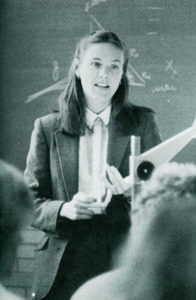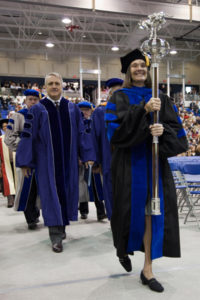2010 Distinguished Lecture Series: Annette L. Bunge
Changing Times, Changing Mines: Reflections on the Evolution of Mines and its Faculty by a Female Professor Studying Human Skin
4 p.m., March 23, 2011, Reception at 3:30 p.m. | Green Center, Metals Hall
Abstract
 In the biological world, adaptation to the external environment is required for survival. The same is true for academic institutions and faculty. In biology, the variation needed for adaptation is introduced through mutation and genetic recombination. In academia, variation is introduced by new faculty and students and by faculty renewal from study in a new field, for example, during a sabbatical.
In the biological world, adaptation to the external environment is required for survival. The same is true for academic institutions and faculty. In biology, the variation needed for adaptation is introduced through mutation and genetic recombination. In academia, variation is introduced by new faculty and students and by faculty renewal from study in a new field, for example, during a sabbatical.
In its 137 year history, Colorado School of Mines and its faculty have survived, even prospered, by adapting to change. This has been especially true over the past 30 years when Mines and its faculty faced significant changes in its traditional industries.
Mines was in the middle of a boom in 1981 when Dr. Bunge started as an assistant professor with research expertise in enhanced oil recovery. The price of oil and minerals were at all time highs and the number of students had more than doubled in less than a decade to 3,000. In response to market demands, most students were majoring in the mineral resources disciplines. Fueled by the women’s movement, the number of female graduates had just topped 100 and of the approximately 180 faculty with professor titles at Mines, seven were female. The newly formed Environmental Sciences Department offered the one and only course in life sciences and the limited biology related research.
 Then, in May 1982, the bust began when Exxon announced it would abandon its billion dollar investment in Colorado oil shale. Times had changed and Mines and its faculty had to adapt.
Then, in May 1982, the bust began when Exxon announced it would abandon its billion dollar investment in Colorado oil shale. Times had changed and Mines and its faculty had to adapt.
Thirty years later Dr. Bunge is now recognized as an expert in chemical absorption into human skin and more than 30 other Mines faculty are conducting research in biology-related areas. Altogether, bioscience research accounts for more than 15 percent of the total research volume. Moreover, Mines students can earn degrees in biochemical engineering, minor in bioengineering and life sciences, or specialize with a biochemistry track in chemistry. The influence of women at Mines has also grown to 32 female professors including a woman as the associate provost and women heading three of the 12 academic departments.
 In this lecture, Dr. Bunge will share her reflections as an active participant in the evolution of Mines with respect to the increased number of female faculty and the emphasis on biology and life sciences. She will also describe her own transition from the study of oil recovery to dermal absorption.
In this lecture, Dr. Bunge will share her reflections as an active participant in the evolution of Mines with respect to the increased number of female faculty and the emphasis on biology and life sciences. She will also describe her own transition from the study of oil recovery to dermal absorption.